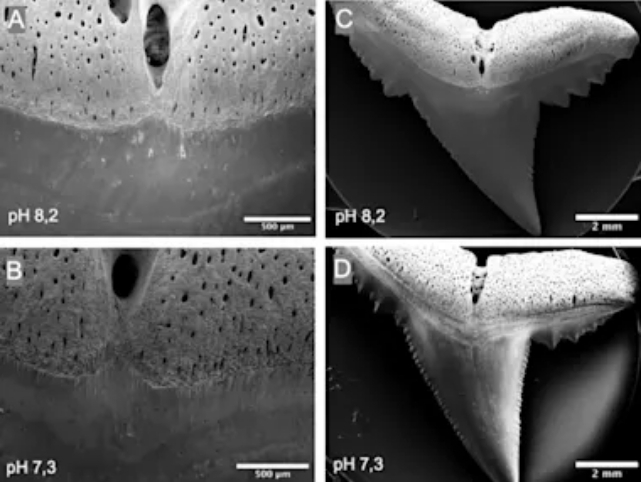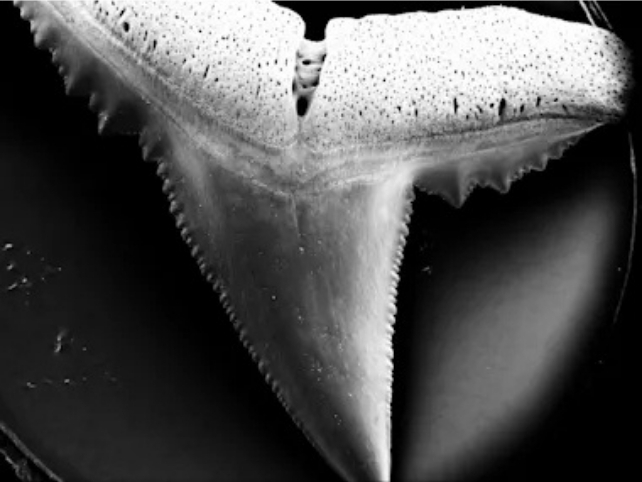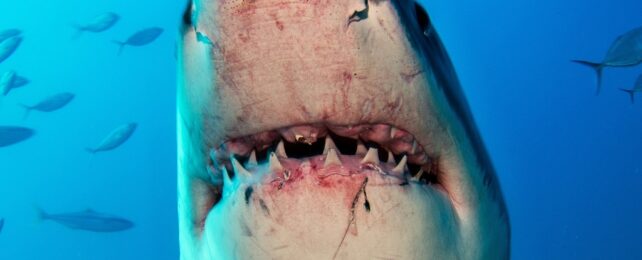Do they make dentures for sharks? In the future, they might need to, with recent research suggesting that sharks may lose their deadly bite to ocean acidification.
Shark teeth are the envy of the animal kingdom: they're sharp and constantly growing. When one tooth falls out, the next is ready to spring up in its place. This dental regeneration is vital to sharks' survival as they (obviously) rely on their fearsome teeth to catch prey.
Yet, despite being made of highly mineralized phosphates and highly adapted to slicing and gnashing, shark teeth are vulnerable to corrosion, says biologist Maximilian Baum from Heinrich Heine University in Germany. Especially as ocean acidification continues to increase due to anthropogenic carbon emissions.
Related: Ocean Acidity Has Reached Critical Levels, And We're All Under Threat
The oceans are an effective carbon sink, absorbing about 30 percent of the carbon dioxide (CO2) released into the atmosphere. But as atmospheric CO2 increases, more of it ends up in the seas. Reacting with seawater, it increases the concentration of hydrogen ions, dropping the pH and leading to ocean acidification.
Additionally, this causes carbonate ions to become less available, affecting the construction of seashells and coral, disrupting aquatic ecology, and adversely affecting a range of sea creatures from shellfish and sea urchins to corals and plankton.
Currently, the average global ocean pH is 8.1, on par with baking soda, for a fun fact. Yet by the year 2300, it's forecast to drop to 7.3, becoming almost 10 times as acidic as it is today.
To ascertain the effects of future ocean acidification on shark teeth, researchers collected more than 600 naturally discarded teeth from blacktip reef sharks (Carcharhinus melanopterus) from the Sealife Oberhausen aquarium in Germany.
Blacktip reef sharks are a vital part of tropical coral reef environments, and their multiple rows of teeth are in constant contact with seawater. Since these sharks employ a passive breathing system, they must swim with their mouths open to help pass oxygen-rich water through their gills.
The researchers then incubated the 16 most immaculate discarded teeth in separate tanks of artificial seawater, one with a pH of 8.2 and one with a pH hovering at 7.3, comparable to forecasted future ocean conditions.

Teeth that had been incubated in more acidic conditions displayed a significant increase in cracks and holes. Every part of the tooth was negatively impacted: acidification caused corrosion of the crowns, degradation of the roots, and often a loss of fine detail in the serrations.
Interestingly, the teeth increased in average circumference, especially at higher pH levels. The authors say that it reflects an increase in irregularities, rather than an actual expansion of the teeth.
The uptick in irregularities could theoretically improve cutting efficiency (serrations are basically irregularities), but it also leaves them weaker and more susceptible to breaking.

These results have profound implications for many marine animals, including sharks, who are already threatened by overfishing.
Acidification may also lead to reduced growth rates and increased nutritional requirements, which will be hard to meet with weaker teeth. Other types of sharks may face lower hatching rates or reduced chemoreceptor sensitivity in a more acidic ocean.
Corrosion could also degrade sharks' dermal denticles, which cover their bodies and functionally act like scales, though they're like teeth in composition. These scales offer both protection as well as increased hydrodynamics, and as they corrode, sharks could lose some of their movement efficiency and therefore face even more energy costs.
Related: World's Oceans on Verge of Being Too Acidic to Sustain Life, Scientists Warn
Overall, this study further highlights the effects of climate change as surprisingly comprehensive, unexpected, and hard to predict: "It's a reminder that climate change impacts cascade through entire food webs and ecosystems," explains Baum.
Finally, the authors do note some limitations, including the fact that they used discarded teeth. The effect of ocean acidification on living teeth, still attached to their sharks, may be different.
The overall impact of acidification is also uncertain, as some elasmobranchs (a group of cartilaginous fish including sharks, skates, and rays) show an ability to maintain blood pH levels in changing conditions. However, scientists will have until 2300 to iron out the finer details.
This research is published in Frontiers in Marine Science.
